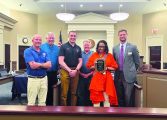By Heather Michon
Correspondent
Consultants for the James River Water Project told the governing board that the currently proposed location for a water pumping station along the James River is still the best option, despite concerns that it could damage or destroy archaeological evidence of the historic Monacan Indian settlement of Rassewek.
Justin Curtis, an attorney for the James River Water Authority (JRWA), presented multiple alternative locations and water sources to the board at their meeting on Feb. 25, ranging from Bremo Bluff to Goochland County.
But project consultants agreed that from the standpoint of both logistics and cost, the best site for the pumping station remained Point of Fork, near Columbia.
The James River Water Project is designed to deliver water to Zion Crossroads and other parts of Louisa and Fluvanna counties. A treatment plant has already been constructed on the Louisa County side of Rt. 6.
Should the JRWA vote to move forward with the existing site, they may face some significant hurdles before construction can continue.
The Virginia Department of Historic Resources (VDHR) and the Army Corps of Engineers (ACOE) declined to issue critical permits in late 2019 after evidence emerged that the lead archaeologist who conducted a survey at the site allegedly lacked the federally-mandated academic credentials for the job. A whistleblower later alleged that the work at the site was badly mismanaged.
The JRWA has filed a suit in Fluvanna County Circuit Court to compel VDHR to accept the archaeologist’s credentials, and Curtis told the board that several of the issues raised by the VDRH have been resolved. A new application for permits could be sent to the ACOE within the next few weeks.
If both agencies approve the permits, the project will almost certainly face a legal challenge from the Monacan Nation.
There is historical and archaeological evidence supporting the Monacans’ contention that Rassewek was located in the area and might be impacted by major construction, and the tribe has indicated it is ready to go to court to protect the site.
Curtis touched on this “assumption” at the meeting. “What we’ve done is we’ve asked multiple times, ‘OK, if you don’t want the project here because you’re going to challenge it because it’s within the area you believe is Rassawek, tell us where Rassawek is and what the boundaries are, and we’ll see if we can go outside of that. To date, no one has been able to tell us that.”
Asked for comment by email, attorney Greg Werkheiser of Cultural Heritage Partners, the firm representing the Monacans, said JRWA’s analysis “is flawed as a matter of law, as we’ll show the federal government.”
Werkheiser added that JRWA continued “to hide from the public the real costs of destroying Rassawek. They’re hiding the huge expense of years of litigation, the full costs of excavating a site of national importance, and reputational harms to Louisa and Fluvanna counties when the world watches them defile a sacred Native American site. What new brewery or housing development will want their water piped through desecrated burials?”
The authority will vote on how to proceed at its March 11 meeting.




